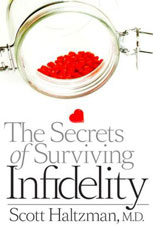Scott Haltzman is a distinguished fellow of the American Psychiatric Association and former clinical assistant professor of psychiatry at Brown University. Up to 40 percent of American marriages are rocked by affairs every year, and the chances of cheating go up each year couples are together. Among the +60 crowd 28 percent of men and 15 percent of women have had at least one indiscretion.
Why do people have affairs? Haltzman points to the following reasons:
1. Having an affair makes someone feel attractive.
2, Same ol' is same ol'.
3. The allure of others.
4. Lack of morality.
5. Addiction steers people off course.
And for those who do not go for these psychological reasons, there is scientific evidence that adultery can be set in motion by three neurotransmitters — norephinephrine, dopamine, and serotonin. It also is influenced by hormones and the biological drive.
One aspect of affairs often depicted in movies is that they usually take place between two responsible people who have absolutely no intention of cheating. That is why Holtzman counsels us to be on the alert for ways in which the Internet makes it easy to find potential mates, including Facebook friendships. He advises us to pay attention to NOD — an acronym for three impulses that lead to adultery: Need, Opportunity, and Disinhibition.
Marital relationships can survive adultery, and Haltzman discusses the four steps to ending an affair, the principles of apology, four guidelines in recovery, and the one rule to a happy marriage. Using examples from his practice, the author sheds new light on a proverbial problem.
